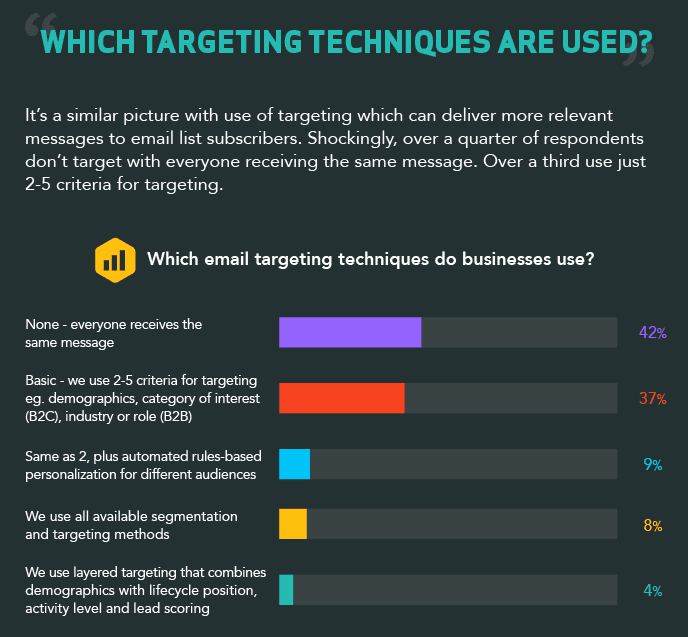Automated customer lifecycle marketing will be the future of email marketing
To look forward to the future of email marketing 2020 - a report I have contributed to from Litmus, I believe we need to look back to appreciate how little the support for marketers from email marketing platforms has evolved to deliver customised lifecycle messaging. Frankly, I have been amazed how few companies have adopted email as a strategic communications tool for personalised, behavioural based email across the years since I started training on email marketing in 2001.
Research on the adoption of email targeting still shows us a reality where the majority of email marketing involves either no segmentation at all or targeting of just 4 to 6 segments.

So, by mid 2017 I’d like to see more support within platforms to deliver on the promise of Email Marketing Automation including:
- Automation of benchmarking and recommendations. Given current variable adoption of best practices, by 2020 systems should step marketers through all the best practices for customised lifecycle marketing, creative and delivery. This should be based on ongoing benchmarking and anonymous comparison against other similar companies.
- Automation of customer lifecycle sequences for the individual. Platforms need to evolve beyond ‘drag and drop’ editors to libraries that automate creation of lifecycle sequences.
- Automation of segmentation. By 2020 platforms will automate creation of target segments based on profile, behaviour and value propositions available from a brand.
- Automation of reporting to show the true effectiveness of email in providing relevance to the individual and value to the company. Much reporting is still based on performance of an individual broadcast. Reporting needs to be smarter, showing success in engaging individuals over time based on segmentation, targeting and value offered to subscribers.
- Automation of creative optimisation. Much testing of email creative is still limited to subject line testing. Why? For larger lists, systems should evolve to better support AB and multivariate testing as has been more widely adopted for websites.
- Automation of integration. Email marketing isn’t a separate activity, but often email activity isn’t integrated with other experiences as a subscriber browses the website or uses a mobile site.
Today the Single Customer View is still a myth for most businesses. Let’s hope this can change if the integrations within Marketing Cloud services improve such that email is just part of the overall digital experience across website and mobile interactions integrated with apps and messaging systems provided by messaging systems like Facebook’s Messenger. But will this happen? Platform vendors have just 4 or 5 years to achieve this; not long given how well-established email marketing is.







